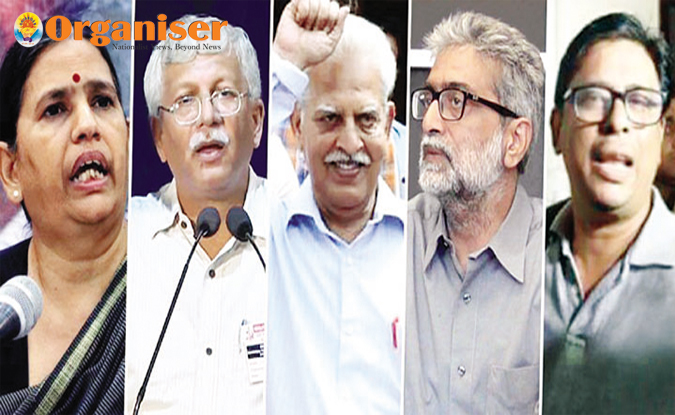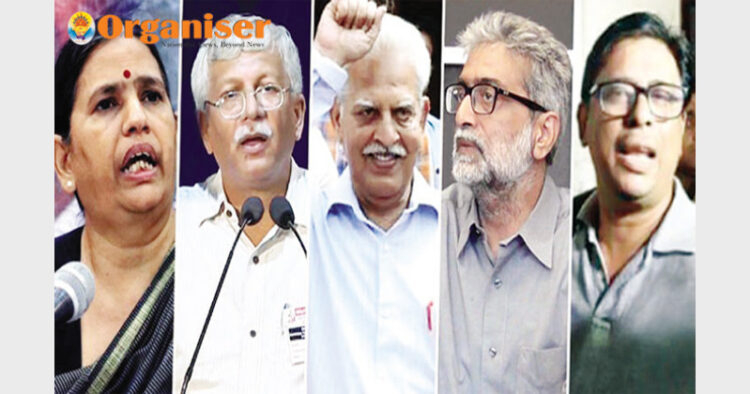While the recent arrests of five Naxal sympathisers under UAPA in Bheema-Koregaon probe have been dubbed as “controversial”, UAPA remains the only legislation in the arsenal of the Union to avert danger to the nation at large
Enemies of the State: (L-R) Sudha Bharadwaj, Vernon Gonsalves, Varavara Rao, Gautam Navlakha, and Arun Ferreira
The revolutionary vehemence with which Congress Party opposed the recent arrests made in connection with the Bhima Koregaon violence and a plot to assassinate Prime Minister Narendra Modi, perhaps is simply unparalleled. Rahul Gandhi’s comrades ably complimented the party president’s fervour. In fact, it put to shame even the left parties – parliamentary and non-parliamentary varieties included.
Best of the complementation, of course, had to come from P Chidambaram. This former Home Minister of “Operation Green Hunt” fame, who once contemplated deployment of Air Force to flush out Naxals, now aired his disquiet by saying holding extreme views, is no legal wrong.
Our intelligentsia has conveniently forgotten that it is same UAPA law under which Kobad Ghandy and Dr Binayak Sen and many others were arrested by the UPA-II. The charges against those two were not as grave as they are today against those arrested. The charge framed today is that of a plot to kill the Prime Minister! There was no such charge against Kobad Ghandy and Dr Binayak Sen. Why then UPA-II arrested and jailed hem? Why was there no furore in the intelligentsia? Is it not glaringly evident that concerns are only political and not human?
A large section of the media is illogically terming the Naxals as intellectuals or human rights activists. Nation has lost thousands of poorest of the poor vanavasis, brave Jawans and many innocent citizens in the Naxal violence. This band of so-called intellectuals has maintained a tacit silence on all these killings. Can the mainstream media cite a single word of condemnation from these “human rights” activists when 57 brave Jawans were massacred by Naxals in April 2010 in Dantewada region of Chhattisgarh?
Provisions of The Unlawful Activities (Prevention) Act, 1967
• The preamble to the 1967 act says “An act to provide for the more effective prevention of certain unlawful activities of individuals and associations….”
• The provisions of the act apply to citizens of India and outside India;
• Definition of “Unlawful Activity” in Chapter 1 says are acts which:
• Bring about the cession of a part of the territory of India or which incites any individual or group of individuals to bring about such cession or secession
• Disclaims, questions disrupts or is intended to disrupt the sovereignty and territorial integrity of India
• Causes or is intended to cause disaffection against India
• Grants to the Central Government the power to prohibit the use of funds of an unlawful association
Relevance of UAPA
Unlawful Activities (Prevention) Act, 1967 (UAPA), arguably, remains the only legislation in the arsenal of the Union to avert danger to the nation at large.
One of the common criticisms, advanced from a legal angularity, is with regard to invocation of the UAPA in addition to the provisions of the Indian Penal Code, 1872 (IPC). It is commonly perceived even among the informed legal fraternity that UAPA is invoked only in case of banned organisations or in case of terrorists. It is necessary to peep into the history of this legislation to examine the veracity of this claim
Given the fact it was enacted in 1967, it remains a popular perception that UAPA has its origins in the Indira era. The fact, however, remains that UAPA was conceived under the Nehru regime, the first Prime Minister. As an outcome of a conference convened under the aegis of the Union, National Integration Council (NIC) was conceived in 1961. NIC, in turn, constituted National Integration and Regionalisation Committee (NIRC), vesting it with the mandate to place reasonable restrictions on associations engaged in unlawful activities in the interests of the sovereignty and integrity of the nation. NIRC recommended the Union to bring about the Constitution (Sixteenth Amendment) Act, 1963 and consequently enact UAPA.
This constitutional amendment, for the very first time, caveated the fundamental right guaranteed under Article 19 of our Constitution and empowered the State to enact any law to place reasonable restrictions, on the fundamental freedoms of speech, assembly and organisation guaranteed under Article 19, intended to protect interests of the sovereignty and integrity of Bharat. Simply put, by the amendment, State could make any legislation intended to place reasonable restrictions in the interest of protecting the sovereignty and integrity of Bharat. Thus, UAPA is a Nehruvian conception implemented later on by Indira Gandhi.
Even though this law remained on the statute book for decades, it was considered highly inadequate to deal with heinous crimes perpetrated on the nation, especially the terrorism jeopardising the very unity and integrity and thus came to Terrorist and Disruptive Activities (Prevention) Act, commonly known as TADA. It came into force in 1985. Under TADA whoever advocated directly or indirectly for cession or secession in any part of India, is liable to be punished. Just when this legislation was needed most, the Congress Government withdrew in 1995. Comprehending this void, Vajapayee led NDA Government brought about the Prevention of Terrorist Activities Act (POTA). Once again Congress had the final say, and POTA was repealed in 2004.
“Anyone suspected of unlawful activities can be arrested under UAPA”
Advocate Prasanna Kumar, Counsel for CBI and NIA, talks to Organiser on the latest arrests and the legal tenability of the same. He represented the CBI in the sensational Rudresh murder case and was instrumental in the upholding the terror charges against the accused.
• There is a lot of hullabaloo over the recent arrests related to Elgar Parishad probe saying that the activists have been randomly targeted. How do you see this?
This happens every time such arrests are made. Even in the case of Rudresh’s murder, they cried that the establishment is targeting the Muslims which was not true. Anyone who is suspected of unlawful activities can be arrested under UAPA.
• There is the argument being made that UAPA applies to organisations and not to individuals as in this case. Is this true?
Not at all. UAPA applies to anyone, including individual and organisations. In fact, anyone who is accused of unlawful acts under the act need not be member of a banned organisation. Section 15 of the UAPA includes a wide set of activities that are deemed unlawful. The intention of the accused and their target is important. Individuals or a group of persons indulging in terror activities, economic terrorism, secessionist activities, etc. can be arrested under the act.
• What could be the next steps if the charges are proven?
If the conspiracy to do criminal acts is proved, they could be arrested and imprisoned. Under UAPA, even meeting to plan for an unlawful activity is punishable. In criminal law, it is called the motive. If it is proved that the accused indulged in activities resulting in destabilising the country even if they did not have individual motives, they are liable to be punished.
Use of UAPA over the years
In the meantime, UAPA was amended, modified and altered time and again by various Congress regimes. Thanks to this frequent interference with its tenets, some ambiguities have crept in about the intent, purport and interpretation of UAPA, especially its applicability to the crimes intended to the crimes jeopardising our national unity and integrity and sovereignty. Be that as it may, presently, UAPA, arguably, remains the only legislation in the arsenal of the Union to avert danger to the nation at large.
Even more interesting is the conduct of some of the State Governments in implementing some of the state laws aimed at tackling terrorism. Consider this curious case of Andhra Pradesh.
Karnataka High Court rejected the argument that UAPA can be invoked only against banned organisations and upheld invocation of UAPA on individuals though they are not part of the banned organisations. It has now been confirmed by the Supreme Court too.
The last but not the least of the legal issues is that many legal experts argue that UAPA can be invoked only against the banned organisation and since these individuals in question are not part of any banned organisation, they could not have been arrested. This specious argument has been rejected by courts. In Rudresh murder case (RSS worker killed in Bengaluru), Karnataka High Court rejected this argument and upheld invocation of UAPA on individuals though they are not part of the banned organisations.
Since the matter is sub judice, it is inadvisable to comment on the merits of the matter. All peace loving and right inking citizens of Bharat are hopeful that truth will triumph. Whatever may happen to the case under trial, Congress and its ecosystem are sure to perpetuate their strange case of Dr Jekyll and Mr Hyde for all times to come.
(The writer is a Bengaluru based lawyer and the Managing Partner of Navayana Law Offices)














Comments